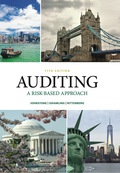
EBK AUDITING: A RISK BASED-APPROACH
11th Edition
ISBN: 9781337670203
Author: RITTENBERG
Publisher: YUZU
expand_more
expand_more
format_list_bulleted
Question
Chapter 1, Problem 26RQSC
a.
To determine
Concept Introduction:
AICPA’s Code of Professional Conduct −AICPA has issued a code of professional conduct which helps the auditors and AICPA members in the performance of their professional duties.
To explain:The given term.
b.
To determine
Concept Introduction:
AICPA’s Code of Professional Conduct − AICPA has issued code of professional conduct which helps the auditors and AICPA members in the performance of their professional duties.
To identify:The situations in which an auditor can disclose confidential client information.
Expert Solution & Answer
Trending nowThis is a popular solution!

Students have asked these similar questions
Help
Clearbrook Inc.'s fixed monthly expenses are $28,000 and its contribution margin ratio is 60%. Assuming that the fixed monthly expenses do not change, what is the best estimate of the company's net operating income in a month when sales are $88,000?
Financial Accounting Question
Chapter 1 Solutions
EBK AUDITING: A RISK BASED-APPROACH
Ch. 1 - Prob. 1CYBKCh. 1 - Prob. 2CYBKCh. 1 - Prob. 3CYBKCh. 1 - Prob. 4CYBKCh. 1 - Prob. 5CYBKCh. 1 - Prob. 6CYBKCh. 1 - Prob. 7CYBKCh. 1 - Prob. 8CYBKCh. 1 - Prob. 9CYBKCh. 1 - Prob. 10CYBK
Ch. 1 - Prob. 11CYBKCh. 1 - Prob. 12CYBKCh. 1 - Utilitarian theory holds that what is ethical is...Ch. 1 - Prob. 14CYBKCh. 1 - Which of the following statements related to...Ch. 1 - Utilitarianism does not require which of the...Ch. 1 - Prob. 17CYBKCh. 1 - Prob. 18CYBKCh. 1 - Prob. 19CYBKCh. 1 - Which of the following factors is not an example...Ch. 1 - Prob. 1RQSCCh. 1 - Prob. 2RQSCCh. 1 - Prob. 3RQSCCh. 1 - Prob. 4RQSCCh. 1 - Prob. 5RQSCCh. 1 - Prob. 6RQSCCh. 1 - Prob. 7RQSCCh. 1 - Prob. 8RQSCCh. 1 - Prob. 9RQSCCh. 1 - Prob. 10RQSCCh. 1 - Prob. 11RQSCCh. 1 - Prob. 12RQSCCh. 1 - Prob. 13RQSCCh. 1 - Prob. 14RQSCCh. 1 - Prob. 15RQSCCh. 1 - Prob. 16RQSCCh. 1 - Prob. 17RQSCCh. 1 - Prob. 18RQSCCh. 1 - Prob. 19RQSCCh. 1 - Prob. 20RQSCCh. 1 - Prob. 21RQSCCh. 1 - Prob. 22RQSCCh. 1 - Prob. 23RQSCCh. 1 - Prob. 24RQSCCh. 1 - Prob. 25RQSCCh. 1 - Prob. 26RQSCCh. 1 - Prob. 27RQSCCh. 1 - Prob. 28RQSCCh. 1 - Prob. 29RQSCCh. 1 - Prob. 30RQSCCh. 1 - Prob. 31RQSCCh. 1 - Refer to the Why It Matters feature “What Is...Ch. 1 - Prob. 33RQSCCh. 1 - Prob. 34RQSCCh. 1 - Prob. 35RQSCCh. 1 - Prob. 36RQSCCh. 1 - Prob. 37RQSCCh. 1 - As the auditor for XYZ Company, you discover that...Ch. 1 - Prob. 39RQSCCh. 1 - Prob. 40RQSCCh. 1 - Prob. 41RQSCCh. 1 - Prob. 42RQSCCh. 1 - Prob. 43FFCh. 1 - Prob. 44FFCh. 1 - Prob. 45FFCh. 1 - Prob. 46FF
Knowledge Booster
Similar questions
- I need help finding the accurate solution to this general accounting problem with valid methods.arrow_forwardAA Corporation's stock has a beta of 2. The risk-free rate is 3.75% and the expected return on the market is 12.92%. What is the required rate of return on AA's stock?arrow_forwardQuick answer of this accounting questionarrow_forward
- Please explain the solution to this financial accounting problem using the correct financial principles.arrow_forwardOn March 1, 20X1, your company, which uses Units-of-Production (UOP) depreciation, purchases a machine for $300,000. You estimate the machine will have a useful life of 3,000,000 units and a residual value of $15,000. In 20X1, the machine produces 110,000 units; in 20X2, it produces 130,000 units. What is the balance in Accumulated Depreciation at the end of 20X2?arrow_forwardCan you explain this general accounting question using accurate calculation methods?arrow_forward
arrow_back_ios
SEE MORE QUESTIONS
arrow_forward_ios
Recommended textbooks for you
 Auditing: A Risk Based-Approach (MindTap Course L...AccountingISBN:9781337619455Author:Karla M Johnstone, Audrey A. Gramling, Larry E. RittenbergPublisher:Cengage Learning
Auditing: A Risk Based-Approach (MindTap Course L...AccountingISBN:9781337619455Author:Karla M Johnstone, Audrey A. Gramling, Larry E. RittenbergPublisher:Cengage Learning Auditing: A Risk Based-Approach to Conducting a Q...AccountingISBN:9781305080577Author:Karla M Johnstone, Audrey A. Gramling, Larry E. RittenbergPublisher:South-Western College Pub
Auditing: A Risk Based-Approach to Conducting a Q...AccountingISBN:9781305080577Author:Karla M Johnstone, Audrey A. Gramling, Larry E. RittenbergPublisher:South-Western College Pub- Business/Professional Ethics Directors/Executives...AccountingISBN:9781337485913Author:BROOKSPublisher:CengageBusiness Its Legal Ethical & Global EnvironmentAccountingISBN:9781305224414Author:JENNINGSPublisher:CengagePrinciples of Accounting Volume 1AccountingISBN:9781947172685Author:OpenStaxPublisher:OpenStax College

Auditing: A Risk Based-Approach (MindTap Course L...
Accounting
ISBN:9781337619455
Author:Karla M Johnstone, Audrey A. Gramling, Larry E. Rittenberg
Publisher:Cengage Learning

Auditing: A Risk Based-Approach to Conducting a Q...
Accounting
ISBN:9781305080577
Author:Karla M Johnstone, Audrey A. Gramling, Larry E. Rittenberg
Publisher:South-Western College Pub


Business/Professional Ethics Directors/Executives...
Accounting
ISBN:9781337485913
Author:BROOKS
Publisher:Cengage

Business Its Legal Ethical & Global Environment
Accounting
ISBN:9781305224414
Author:JENNINGS
Publisher:Cengage

Principles of Accounting Volume 1
Accounting
ISBN:9781947172685
Author:OpenStax
Publisher:OpenStax College